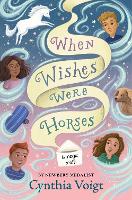


|
|
|
books
| book details |
When Wishes Were Horses
By (author) Cynthia Voigt

|
This book is currently unavailable. Enquire to check if we can source a used copy
|
| book description |
What would you wish for? In this young middle-grade novel by the Newbery Medal- and Newbery Honor-winning author, four kids in the same town are each granted two wishes. Full of magic, adventure, friendship, family, surprises, and lots of dogs, this is for readers who love Katherine Applegate and Sara Pennypacker. How do such things happen? Something appears, sudden as disaster. It wasn't there and now it is. An envelope arrives, in your mailbox, on your dinner table, your dresser, your computer keyboard. It's in your hand. You are alone when it finds you. No one else sees it, to ask about it or take it from you. There is only your name on the envelope. Inside, two pieces of pale gray tissue paper, each the size of a playing card, and simple instructions: ONE WISH AT A TIME WHISPER IT TO ME BE WISE Magic? Impossible. But what if . . . ? Casey, Zoe, Billy, and Bug live in the same town. They don't know one another . . . yet. But mysteriously, they are connected by magic. Specifically, they've each been given two wishes. What would you wish for? Casey yearns for a dog. Zoe wants her parents to stop fighting. Billy has always wanted a unicorn. Bug would love a Lego kit, a really complicated one. And do their wishes come true? The answer may surprise you.
| product details |
Normally shipped |
Publisher | HarperCollins Publishers Inc
Published date | 13 Aug 2024
Language |
Format | Digital (delivered electronically)
Pages | 224
Dimensions | 0 x 0 x 0mm (L x W x H)
Weight | 0g
ISBN | 978-0-0629-9694-7
Readership Age |
BISAC | juvenile fiction / social situations / friendship
| other options |
|
|
|
To view the items in your trolley please sign in.
| sign in |
|
|
|
| specials |
|
|

|
Mason Coile
Paperback / softback
224 pages
was: R 520.95
now: R 468.95
|
A terrifying locked-room mystery set in a remote outpost on Mars.
|
An epic love story with the pulse of a thriller that asks: what would you risk for a second chance at first love?
|
|
|
|
|